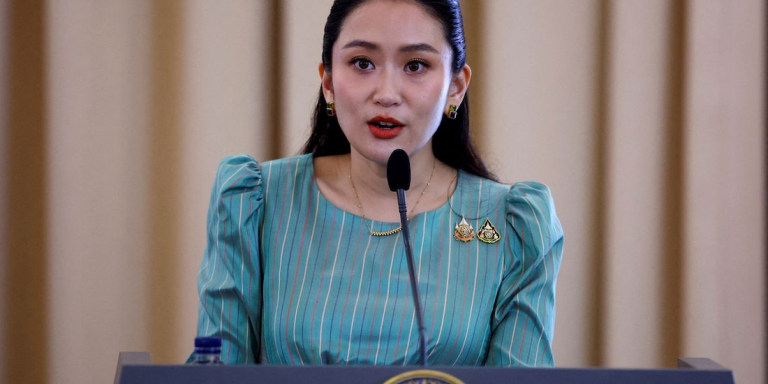
Political turmoil engulfs Thailand as border tensions with Cambodia escalate following diplomatic leak
New York, N.Y. – Thailand’s Prime Minister Paetongtarn Shinawatra has apologized for the political turbulence set off by a leaked recording of her negotiating with Cambodia’s former leader in the two nations’ latest border dispute.
The diplomatic crisis has triggered a cascade of events that now threatens the stability of Thailand’s government and Southeast Asian regional relations.
Government Coalition Crumbles Amid Public Outrage
Soon after the leak, a major coalition partner, the Bhumjaithai Party, quit the ruling government, leaving Prime Minister Paetongtarn Shinawatra facing unprecedented political pressure. The 17-minute leaked phone conversation between Shinawatra and Hun Sen, Cambodia’s influential former prime minister, has exposed private negotiations that many Thais view as undermining their country’s sovereignty.
During the call, the Thai premier told Hun Sen that she was under domestic pressure and urged him not to listen to “the opposite side”, including a prominent Thai military commander at the border. This revelation has sparked fierce criticism from opposition politicians and Thai citizens who question whether their leader was making unauthorized concessions to Cambodia’s former strongman.
The Shinawatra family has long maintained controversial ties with Cambodia’s leadership. The governments of Thailand and Cambodia previously enjoyed warmer ties, owing to a friendship between former leaders, Thaksin Shinawatra from Thailand and Cambodia’s Hun Sen. Thaksin’s daughter, Paetongtarn Shinawatra, and Hun Sen’s son, Hun Manet, are now the incumbent prime ministers of their respective nations, creating a unique dynamic of inherited political relationships.
Border Tensions Escalate to Economic Warfare
The diplomatic fallout has rapidly escalated beyond mere political rhetoric. Cambodia’s PM Hun Manet announced that the decision would take effect from midnight on Sunday to halt fuel and gas imports from Thailand, marking a significant economic retaliation that threatens bilateral trade relationships.
The current crisis stems from a fatal border clash that occurred in May 2025, when Cambodia said one of its soldiers was killed in a brief gunfight with Thai troops at a sensitive border region. The incident reignited long-standing territorial disputes between the two Southeast Asian neighbors over contested border areas.
Hun Sen, who relinquished the Cambodian prime ministership to his son but remains influential, reacted to the skirmish, saying that he supports the “decision to send troops and heavy weapons to the border to prepare for a counterattack in case of a further invasion.” His militant rhetoric has further inflamed tensions and complicated diplomatic efforts to resolve the dispute.
Hun Sen’s Shadow Looms Over Regional Politics
Hun Sen, who ruled Cambodia for nearly four decades, remains a controversial figure whose authoritarian legacy continues to influence regional politics even after officially stepping down. Hun Manet became prime minister of Cambodia, having essentially been groomed for and handed the position by his father, longtime autocrat Hun Sen, in what observers have characterized as a dynastic succession.
Hun Sen and his family were estimated to have amassed between US$500 million and US$1 billion by Global Witness in 2016, highlighting the extent of wealth accumulation during his authoritarian rule. The former prime minister’s continued involvement in border negotiations, despite no longer holding official office, underscores his persistent influence over Cambodian policy.
Hun Manet, 45, the son and a four-star general in Cambodia’s military, was elected by all 123 members of Cambodia’s lower house of parliament who were present for the vote in August 2023, in what analysts described as a transition likened by some to a Southeast Asian version of North Korea‘s dynastic leadership.
Thai Democracy Under Pressure
The leaked phone call has exposed deeper vulnerabilities in Thailand’s democratic institutions and raised questions about Prime Minister Shinawatra’s leadership capabilities. Thailand’s government said on Monday it would complete a cabinet reshuffle this week and promised a “new way of working”, as Prime Minister Paetongtarn Shinawatra battles to stay in power after drawing sharp criticism of her handling of a border row with Cambodia.
The crisis has also highlighted the complex dynamics of the Shinawatra political dynasty, which has dominated Thai politics for over two decades despite repeated military coups and political upheavals. Paetongtarn Shinawatra, daughter of former Prime Minister Thaksin Shinawatra, now faces the challenge of maintaining power while managing both domestic opposition and international relations.
The timing of this crisis is particularly problematic for Thailand, which has been working to restore stability and economic growth following years of political turbulence. The breakdown in relations with Cambodia threatens not only bilateral trade but also broader ASEAN regional cooperation initiatives.
As tensions continue to escalate, both nations have reinforced their border positions with additional troops and military equipment, raising concerns about potential future conflicts. The international community, including ASEAN member states, is closely monitoring the situation and calling for diplomatic solutions to prevent further deterioration of regional stability.
The current crisis represents a critical test for both young leaders and their ability to move beyond the confrontational politics of their predecessors while managing complex territorial and economic disputes in an increasingly interconnected Southeast Asian region.
Thai Prime Minister’s Leaked Call With Cambodia Sparks Crisis (June 23, 2025)
75-Word Audio Summary
Thailand faces political crisis after Prime Minister Paetongtarn Shinawatra’s leaked phone call with Cambodia’s former strongman Hun Sen sparked public outrage. The diplomatic scandal triggered coalition collapse and economic retaliation from Cambodia, which halted fuel imports. Border tensions escalated following May’s fatal clash between soldiers. Hun Sen’s continued influence despite his son Hun Manet becoming Cambodia’s Prime Minister reflects dynastic succession patterns troubling regional democracy advocates and Thailand’s stability.